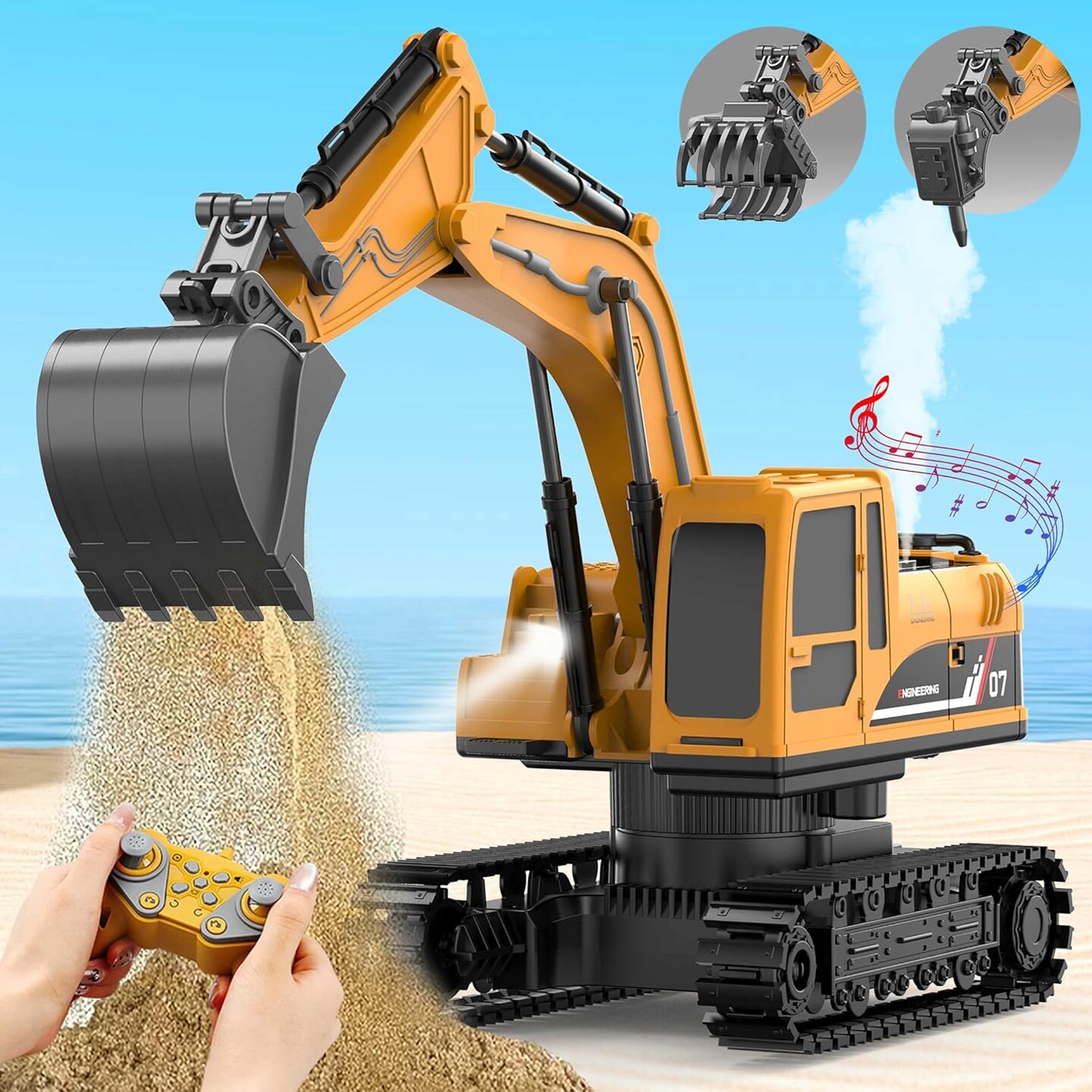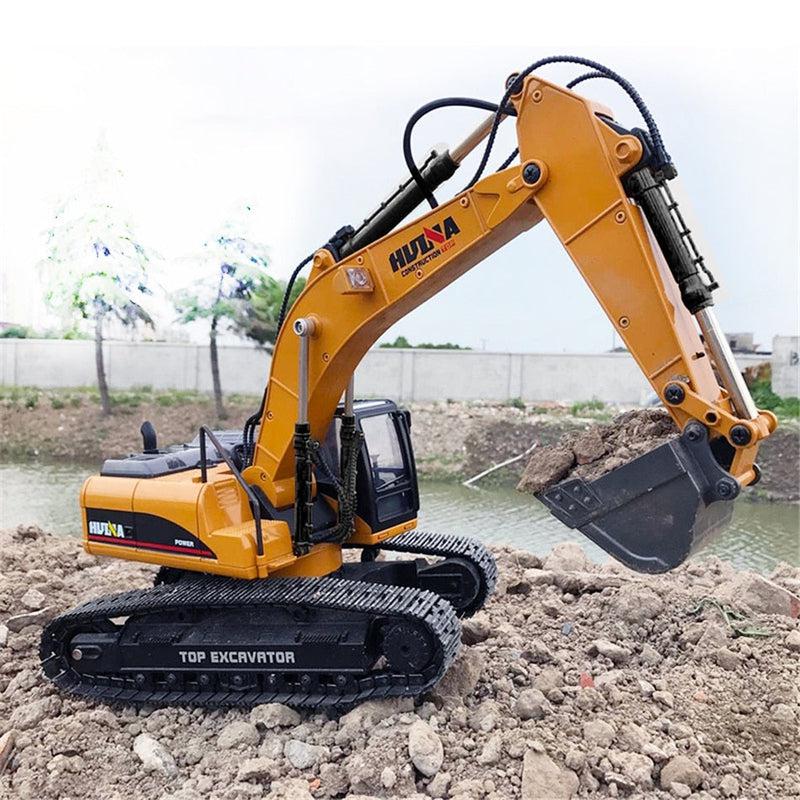Step-by-Step Guide to Operating a rc excavator Like a Pro
Wiki Article
Discover the Relevance of Excavator in Modern Building And Construction Projects
Excavators are vital devices in modern building tasks. Their adaptability enables them to execute a vast array of jobs, from excavating and grading to demolition and website prep work. Advanced features, such as hydraulic attachments and general practitioners, improve their capabilities and performance on task websites. As the industry progresses, the relevance of excavators expands a lot more. Comprehending their function can reveal insights into the future of building practices. What lies ahead for these equipments?The Convenience of Excavators in Different Projects
Although excavators are often related to large-scale construction projects, their adaptability allows them to be utilized in a wide range of applications, from household landscaping to utility upkeep. In urban setups, excavators can navigate tight areas to dig foundations for homes or set up drain systems. Their capability to perform fragile tasks makes them suitable for landscape design tasks, where they can excavate for ponds or plant trees. Additionally, excavators play a crucial duty in utility upkeep, successfully excavating trenches for pipes or wires without disrupting bordering areas. In farming applications, they help in land cleaning and soil preparation. Their versatility allows them to be equipped with numerous accessories, boosting their performance across various tasks. This complex nature of excavators not only improves different building and construction procedures however additionally demonstrates their indispensable role in contemporary framework advancement and upkeep.Secret Attributes and Sorts Of Excavators
The conversation on crucial features and kinds of excavators highlights the necessary features that make these equipments vital in building and construction. Different excavator types, each developed for specific jobs, demonstrate their versatility and performance across various applications. rc excavator. Understanding these categories and functions is crucial for enhancing their usage in modern-day building and construction projectsExcavator Enters Overview
Excavators play an essential duty in modern building, supplying adaptability and performance throughout different jobs. These heavy equipment systems been available in numerous types, each tailored for specific applications. The most usual types include spider excavators, understood for their security on irregular surface, and wheeled excavators, which provide better wheelchair on paved surface areas. Tiny excavators are preferred for small tasks and tight areas, while long-reach excavators are created for deep digging. In addition, there are specific excavators, such as hydraulic excavators, which improve power and accuracy. Each type features distinct capabilities, making them important for tasks ranging from digging and grading to demolition and product handling. Understanding these variations enables construction experts to select the best excavator for their project requires.Trick Includes Explained
Comprehending the vital functions of excavators improves their effective application in building and construction tasks. Excavators are characterized by their powerful hydraulic systems, which supply the needed pressure for digging, lifting, and moving materials. Their verbalized arms permit a large range of motion, helping with specific procedures in constrained spaces. Furthermore, the variety of attachments, such as pails, grapples, and augers, broadens their convenience to satisfy various project requirements. The size and weight of excavators likewise add to their stability and maneuverability on numerous terrains. Innovations in technology have led to the integration of General practitioner and automation, boosting precision and effectiveness in excavation jobs. These attributes collectively place excavators as vital tools in modern-day building and construction.Applications in Construction
Changing building and construction sites, excavators play an essential role across different applications, varying from property building jobs to large infrastructure developments. These versatile makers are geared up for tasks such as digging structures, trenching for energies, and site grading. Various types of excavators, consisting of crawler, rolled, and mini excavators, supply specific advantages customized to the job needs. Crawler excavators stand out in rough terrains, while wheeled excavators use mobility on paved surfaces. Mini excavators are ideal for confined rooms, making them prominent in urban settings. The effectiveness and power of excavators substantially speed up building processes, ensuring prompt task completion. Their versatility better enhances their importance, enabling building teams to tackle a varied array of difficulties effectively.Enhancing Effectiveness and Efficiency on Work Sites
Optimizing performance and efficiency on work sites is an essential objective in modern building. Excavators play a critical function in achieving this goal by simplifying different tasks. Their capability to execute multiple functions-- such as excavating, grading, and lifting-- lowers the requirement for additional devices, consequently conserving time and resources.Moreover, excavators enhance operations by permitting faster completion of projects. With advanced attributes like hydraulic attachments and GPS technology, they can carry out precise procedures that reduce errors and remodel. This precision not only enhances the top quality of job but likewise optimizes product use, adding to set you back savings.The versatility of excavators enables them to adjust to various site conditions, guaranteeing that projects progress smoothly despite additional resources challenges. By integrating excavators into building and construction procedures, groups can substantially improve their total efficiency, bring about prompt project conclusion and boosted earnings.Security Benefits of Utilizing Excavators
Excavators considerably boost security on building and construction websites through improved operator presence and reduced hands-on labor dangers. By offering operators with a clear view of their environments, excavators help to prevent crashes and injuries. Additionally, the machinery lessens the demand for employees to participate in harmful hand-operated jobs, even more promoting a much safer workplace.Enhanced Driver Visibility
Construction websites can be chaotic and filled with prospective dangers, improved driver presence plays an essential role in making certain security when using excavators. Modern excavators are designed with large, unblocked windows and tactically placed mirrors, allowing operators to maintain a clear sight of their environments (rc excavator). This improved presence is crucial for spotting pedestrians, other machinery, and different barriers, substantially reducing the threat of accidents. Additionally, many excavators include innovative modern technology, such as electronic cameras and sensors, to offer operators with extra perspectives, better enhancing understanding. The ability to see even more clearly not only help in efficient operation however likewise fosters a more secure work environment, making it much easier for operators to navigate complicated construction websites without compromising safety and security standardsDecreased Guidebook Labor Threats
When manual work is reduced via the usage of excavators, countless safety and security advantages emerge, significantly enhancing the health of construction workers. Excavators minimize the physical stress connected with hefty lifting and recurring tasks, properly decreasing the danger of musculoskeletal injuries. By automating processes such as excavating, grading, and relocating materials, they allow employees to keep a safer distance from potential threats. Furthermore, excavators are geared up with sophisticated safety features, such as rollover protection systems and improved driver ergonomics, which additionally safeguard personnel on site. The result is a substantial decrease in workplace accidents and injuries, bring about boosted performance and morale among building and construction groups. Ultimately, the fostering of excavators adds to a safer and much more reliable building and construction atmosphere.Excavators in Earthmoving and Site Prep Work
In contemporary building, a significant section of earthmoving and site preparation jobs relies upon the effectiveness and adaptability of excavators. These makers are created to take care of different dirt kinds and terrain, making them vital for rating, excavating, and trenching activities. Their hydraulic arms can be furnished with different attachments, such as pails and augers, enabling drivers to personalize their approach based upon certain job requirements.Excavators excel at relocating huge volumes of earth rapidly and successfully, which increases the overall building and construction timeline. They can browse limited spaces and challenging sites where conventional devices may battle, boosting performance. Furthermore, the precision of excavators guarantees that site prep work sticks to stringent specifications, decreasing the danger of errors that can bring about expensive rework.The Duty of Excavators in Demolition Tasks
Excavators play an essential role in demolition jobs, as they have the power and agility required to take apart frameworks efficiently. Outfitted with different add-ons such as hydraulic breakers, shears, and grapples, these devices can adjust to various demolition requirements, whether for tiny buildings or large industrial sites. Their versatility allows operators to take on complex projects while keeping security and precision.In addition to their demolition capacities, excavators help with debris removal, ensuring that work websites continue to be safe and well organized. By breaking down frameworks right into manageable items, they permit for streamlined cleaning and recycling of products, aligning with contemporary sustainability efforts.Moreover, excavators can access tight spaces and navigate uneven terrain, making them essential in metropolitan demolition jobs. On the whole, their robust layout and multifunctionality make excavators a vital possession in the demolition phase of construction, contributing significantly to task timelines and performance.

Future Patterns in Excavator Innovation and Usage
As the construction sector develops, improvements in excavator innovation are poised to change their usage and efficiency substantially. One substantial fad is the integration of automation and expert system, enabling excavators to operate with very little human treatment. This change will certainly enhance precision in tasks such as grading and trenching, lowering human mistake and boosting productivity.Additionally, the rise of electrical and hybrid excavators is shaping a much more lasting building and construction environment, reducing carbon discharges and gas expenses. Improved telematics systems are likewise emerging, enabling real-time monitoring of my sources device efficiency and upkeep demands, which can cause better functional efficiency and longer tools lifespan.Moreover, developments in accessory technology are broadening the versatility of excavators, permitting them to perform a wider variety of tasks. The combination of these trends demonstrates a future where excavators are smarter, greener, and much more versatile, ultimately reshaping building and construction job dynamics.
Often Asked Inquiries
Exactly How Do Excavators Compare to Various Other Construction Equipment?
Excavators, identified by their convenience and power, stand out in digging and earthmoving contrasted to other equipment. Their capability to do various tasks, consisting of lifting and demolition, makes them essential in building and construction jobs, boosting general efficiency.
What Is the Average Lifespan of an Excavator?
The ordinary lifespan of an excavator normally ranges from 7,000 to 10,000 operating hours, depending upon upkeep, use problems, and model. Appropriate care can prolong this life-span, guaranteeing peak performance throughout its operational years.Exactly How Are Excavators Kept for Optimum Performance?
Excavators require regular maintenance for peak efficiency, consisting of routine dig this evaluations, fluid checks, filter substitutes, and prompt fixings. Implementing a preventive upkeep routine aids extend their life-span and assurances effective operation in various construction atmospheres.What Are the Prices Related To Acquiring an excavator vs. leasing?
The prices related to renting out versus buying an excavator vary significantly. Leasing offers lower upfront expenses but can build up in time, while acquiring calls for a considerable first financial investment, yet supplies lasting savings and property ownership advantages.What Training Is Called For to Run an Excavator?
Operating an excavator requires specialized training, commonly including security protocols, machine operation strategies, and ecological recognition. Accreditation programs frequently mandate practical experience, making it possible for drivers to handle different tasks effectively while making certain compliance with market laws. The most common types include crawler excavators, understood for their stability on unequal terrain, and rolled excavators, which offer greater mobility on paved surface areas. Mini excavators are favored for tight areas and small-scale jobs, while long-reach excavators are designed for deep digging. Additionally, there are specialized excavators, such as hydraulic excavators, which enhance power and accuracy. Various kinds of excavators, consisting of spider, rolled, and mini excavators, provide particular benefits customized to the task needs. Spider excavators excel in rough surfaces, while rolled excavators offer mobility on smooth surfaces.Report this wiki page